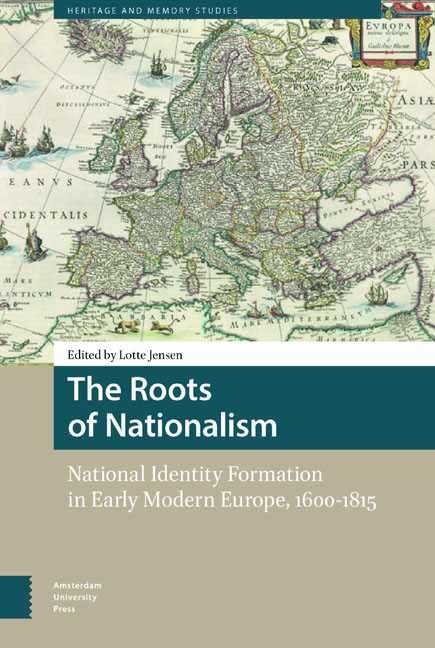Book contents
- Frontmatter
- Contents
- The Roots of Nationalism: Introduction
- Part One The Modernist Paradigm Contested
- Part Two The Genealogy of National Identity
- Part Three Negative Mirror Imaging
- Part Four Maps, Language and Canonisation
- Part Five Nation in the Age of Revolution
- List of Illustrations
- List of Contributors
- Index
10 - Negative Mirror Images in Anglo-Dutch Relations, 1650-1674
Published online by Cambridge University Press: 03 February 2021
- Frontmatter
- Contents
- The Roots of Nationalism: Introduction
- Part One The Modernist Paradigm Contested
- Part Two The Genealogy of National Identity
- Part Three Negative Mirror Imaging
- Part Four Maps, Language and Canonisation
- Part Five Nation in the Age of Revolution
- List of Illustrations
- List of Contributors
- Index
Summary
In 1652, shortly after the outbreak of the First Anglo-Dutch War (1652-54), a Dutch author, calling himself ‘a free Hollander’, published an anti-English pamphlet, the Dutch title of which could be translated as ‘English Alarm, or signs of war detected in her unfaithful and godless actions against the regents and subjects of the seven free United Provinces’. The patriotic pamphleteer characterised the leaders of the English Commonwealth as ‘presumptuous devils who believe everyone should dance to their tune’. The aggression of the ‘godless tailed men’ against the Dutch Republic was motivated by jealous greed, he claimed, while the execution of King Charles I in 1649 by Parliament had been ‘disgraceful’, ‘tyrannical’ and a ‘regicide’. England could not bear comparison with the United Provinces, which had always, until the premature death of stadholder William II in 1650, been governed by a lord and provincial Estates in joint sovereignty and had never, in recent times, deposed a lawful sovereign, as the English Commonwealth had now done. Thus, comparisons between the two states did not hold water.
Besides the obvious fact of the Dutch authors’ desire to convince their compatriots that the Commonwealth's grounds for war, and its political and economic intentions, were unjust and immoral, the pamphlet illustrates how authors created negative mirror-images of their enemy's nations, states and identities. This means that these authors attributed negative character traits – cultural, political, religious or other – that were the exact opposites of those comprising their own self-image to another nation or state. In this way, they contributed towards a reinterpretation or stereotyping of ‘the other’, while simultaneously redefining or strengthening their own nation's or state's identity, implicitly and sometimes also explicitly. This article intends to analyse the political and cultural contexts of the negative mirror images created of the English by Dutch authors during the three seventeenth-century Anglo-Dutch Wars, and their function, intentional or unintentional, as tools of Dutch identity construction.
Mutual Image Formation
Fought in the third quarter of the seventeenth century, the three Anglo- Dutch Wars were essentially the result of a reverse in the balance of power between the two states. During the first decades of their revolt against the Spanish Habsburgs, the Dutch provinces had sought and received help from England.
- Type
- Chapter
- Information
- The Roots of NationalismNational Identity Formation in Early Modern Europe, 1600–1815, pp. 199 - 216Publisher: Amsterdam University PressPrint publication year: 2016
- 1
- Cited by



